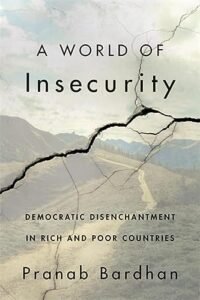Pranab Bardhan (2022), A World of Insecurity: Democratic Disenchantment in Rich and Poor Countries, Harvard University Press.
Dr. Debtanu Majee

The eminent economist Pranab Bardhan showcases the danger that liberal democracy is encountering across the world in his book ‘A World of Insecurity: Democratic Disenchantment in Rich and Poor Countries’. This book was published by Harvard University Press in 2022. Bardhan identified structural causes like economic and cultural insecurity in both developed and developing nations as reasons behind democratic backsliding and public disillusionment, in contrast to Rachman’s ‘The Age of the Strongman: How the Cult of the Leader Threatens Democracy Around the World’, which holds populist demagogues responsible for democratic backsliding. Bardhan’s book is a must-read for anyone concerned with human security, developmental studies, democracy, and governance.
Summary
The book consists of an introduction and nine chapters. In keeping with convention, the introduction provides a brief outline of the subsequent chapters. Chapter one of the book is concerned with insecurity, inequality, and democracy in rich and poor countries. The chapter explores the rise of populist demagogues, the interaction between global integration and automation, why people are moving to right-wing parties, cultural insecurity, resentment of the elite, and the role of social media in creating false narratives, sharpening polarization, and disseminating conspiracy theories. In the second chapter, the author argues for restoring autonomy and control at the local community level. The third chapter of the book deals with the resurgence of nationalism across the world. The chapter starts with the historical origins of nationalism. Next, the author focuses on various forms of nationalism—civic, ethnic, and economic nationalism. In the fourth chapter, the author discusses how the world has become attracted to the authoritarian capitalism model that has been practiced successfully by China to achieve rapid economic growth while maintaining tight political control. In this chapter, the author also examines the relationship between democracy and development, highlights the nature of a strong state and the ingredients of state capacity, and points out the strengths and weaknesses of the Chinese governance system. Chapter five of the book is concerned with minority rights within the framework of majoritarian democracy. Bardhan suggests that social diversity and institutional structure are important to protect the rights of minorities. In chapter six, Bardhan regards social democracy as an ideological balancing act and asserts the rejuvenation of social democracy, proposing certain modifications to address the current problems of liberal democracy. Chapter seven provides insights into the relationship between democracy and capitalism and the ways of restructuring their fraught link. Chapter eight examines the feasibility of universal basic income as a means to protect the economic security of individuals. Chapter nine discusses a diverse range of policies, including the creation of good and green jobs, combating corruption, and building trust in governance to meet the challenges of a world of insecurity.
Analysis
Bardhan effectively applied a balanced approach in exploring the liberal and populist discourse throughout the book. He has been smart to acknowledge the grievances of various segments of society without endorsing reactionary politics. He has rightly pointed out that insecurity agitates people more than inequality. By applying the method of comparative and structural analysis, he has identified that economic insecurity and cultural insecurity have engendered populist uprisings. He has correctly claimed that across the world, populist leaders have rallied communities for the cause of ‘taking back control’, but they have not devolved power to the local communities. His warning to the liberals about communitarian romanticism and his critical analysis of the costs of localism have strengthened his non-biased position. As an economist, he has leveraged his expertise and pointed out accurately the economic consequences of the policies arising from ethnic and civic nationalism. He has held ethnic nationalism responsible for destroying diversity. Most importantly, Bardhan has urged the readers not to think of democracy just as a procedural mechanism but as a political system that must address the challenges that are prevalent in this world of insecurity. He has turned to social democracy with some necessary modifications to address the problems related to human insecurity.
Criticism
The author has successfully avoided any kind of ideological binaries. In the age of political polarization, he has rightly argued for the revival of solidaristic politics while criticizing market fundamentalism and authoritarian statism. His analysis has also not failed to point out how culturalism has gained momentum due to the Left's failure to rebuild grassroots movements. However, a major shortcoming of this book is that the author has presented only a few general suggestions to address the challenges encountered by an increasingly insecure world. He should have provided a comprehensive policy framework to deal with the prevailing challenges. One can also question his policy prescription of international coordination in this age of de-globalization. However, one cannot deny Bardhan’s main argument that the crisis of democracy is intensifying in a world of insecurity.
Conclusion
This book can be regarded as a thoughtful and timely intervention in the global debate on democracy, security, and development. To understand the complex political malaise of the contemporary world, one must read this book. More inclusive and humane politics has been the demand of this book. Though the book was published three years ago, it holds significant relevance today as human insecurity is rising due to cultural conflicts, war, economic insecurity, health insecurity, environmental insecurity, and political insecurity.
Dr. Debtanu Majee is an Assistant Professor at the Department of Political Science, Bidhan Chandra College, Rishra, West Bengal, India.
